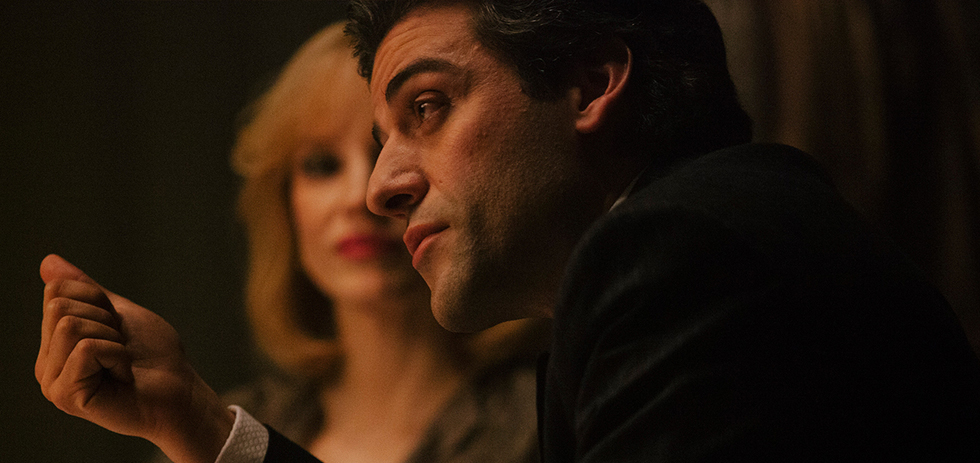
JC Chandor’s debut film, Margin Call, was a feat in talky suspense, delivering a slick tale of Mamet-esque Wall Street deception heavy on detail that never got bogged down nor lost its audience. His second feature, All Is Lost, featured practically no dialogue as it followed one man’s efforts to survive at sea. As such, much of the critical dialogue that has surrounded Chandor up to this point has concerned the stark contrast between the two, and the question of distinction within one’s own filmography. In A Most Violent Year, Chandor delivers a tight, understated drama that does not sit neatly within this dichotomy. Freed of this false binary, A Most Violent Year is an accomplished thriller that may show Chandor’s trademark confidence, but avoids being measured simply for its demonstration of range.
A Most Violent Year follows Oscar Isaacs’ Abel Morales, a New York businessman who sells fuel in genuinely cutthroat market. A self-made man who has risen from truck driver to business owner, Abel is now on the cusp of expanding into buying a crucial new property with critical river access and tanks. Having muscled his way into the market, his competitors are viciously attempting to muscle him out, with his drivers being attacked and his trucks regularly stolen, their precious contents sold on. While fighting his competitors with one hand, Abel is fighting off the District Attorney (David Oyelowo) and an incriminating investigation with the other, all while trying to win over the bank to back his property acquisition. Soon Abel finds even his wife (Jessica Chastain) and family aren’t safe, with gunmen visiting his house at night. Slow to unravel, the film takes some time to reveal all the pieces, feeding us only enough information to make sense of the plot and maintain the suspense.The film is set in 1981 (the eponymous violent year refers to an all-time crime rate high) and grounds us firmly but quietly in this aesthetic – it carries enough shoulder pads and vintage cars to draw us into the period without jolting us from the narrative with bombastic set dressing (see: American Hustle). There’s a quiet confidence to the design that echoes throughout the film, from to elusive but engaging dialogue to the brisk but suspenseful pacing.
As Abel, Isaacs is compelling and charismatic, giving us enough of the pride and pig-headedness of self-made upwardly mobile man without alienating us, tempering determination with empathy. There is a seething undercurrent to Isaac’s performance that never overplays its hand, crafting a character that trades on suggestion. In those scenes in which he delivers on that undercurrent, Isaacs does not hold back. Chastain is unsurprisingly a tour de force, her Anna the unsung key to Abel’s success with her business acumen and father’s mob money. She is trashy without being tasteless – fake nails, big house, scathing condescension. Oyelowo is excellent as an occasional moral centre, and Albert Brooks gives functional if uninteresting support as Abel’s lawyer.
In Abel Morales, Chandor and Isaacs give us a man caught between who he wants to be and who he must be to survive. Throughout the film, Chandor shows us the tension between truth and appearances – from Chastain’s glamorous suburban mum who has never stopped being a gangster’s daughter to Oyelowo’s righteous representative of the law who has his own ambitions. This is seen most bald-facedly in Abel’s competitors, led by Alessandro Nivola’s Peter Forente, who can sit at a table with him and not blink when he accuses them of stealing from him, though it permeates every element of the film, right up to Abel’s instructions to his salesmen, to request tea over coffee during their house calls, in order to appear more sophisticated.
This is most firmly anchored in Abel, who teeters on this divide – a man who cannot avoid what the city demands of him. He does not want his drivers to carry guns – they take their own on their routes anyway, with devastating and ultimately climactic results. He does not want to stoop to the level of his competitors, but has to engage in his own underhand fighting to save his business. Extolling against violence, he shows himself to be horrifyingly capable of it. This is captured with startling clarity in a scene in which he has chased down one of the truckjackers and proceeds to beat him brutally for answers – the push and pull between ideal and reality, intention and the inevitable play across Isaacs face as he decides whether or not to deliver the final blow. In the end, Abel’s success depends on deception, though not necessarily his own, as Chandor shows us how helpless he is against the unstoppable force of human nature.
Around the Staff
| Felix Hubble | |
| Jessica Ellicott |
